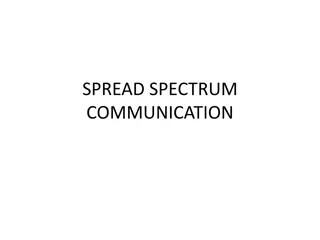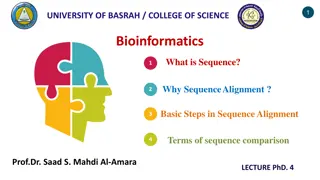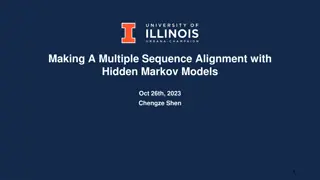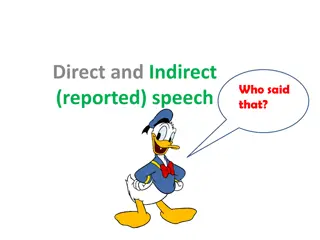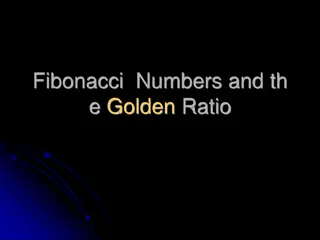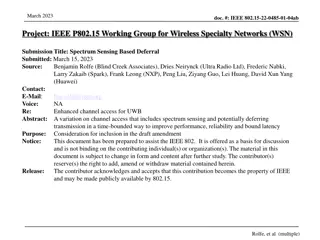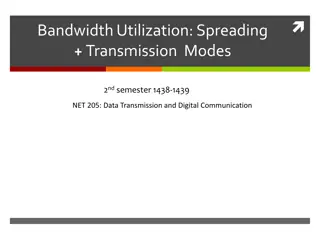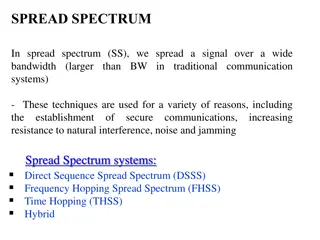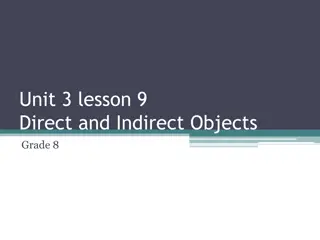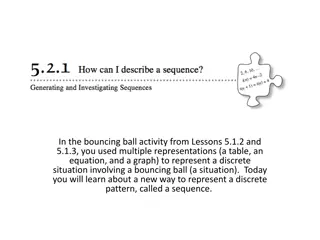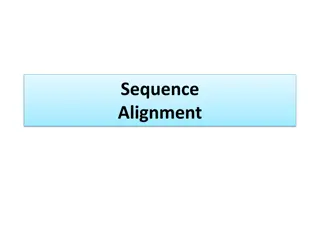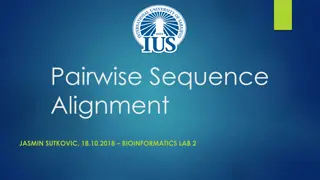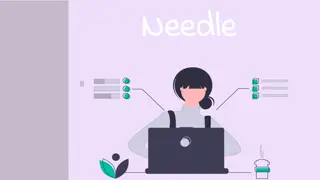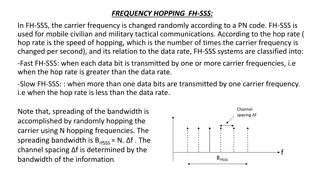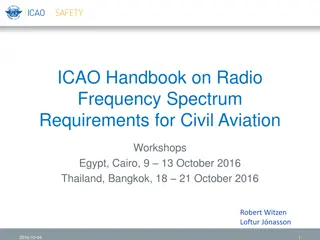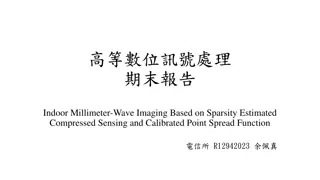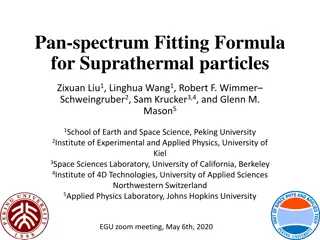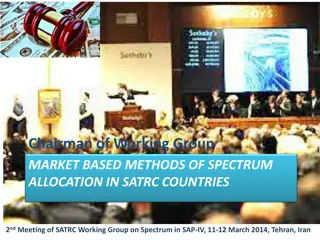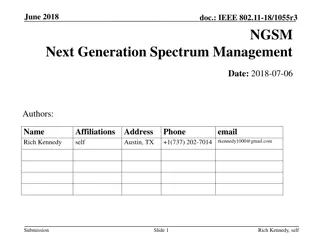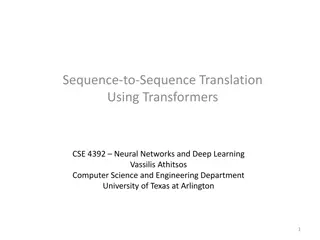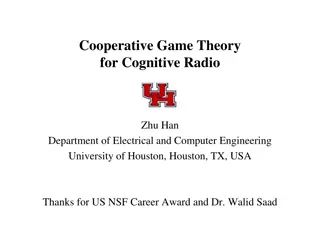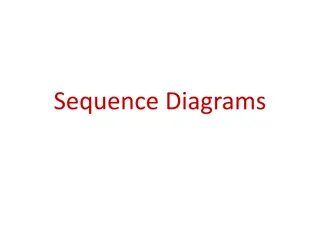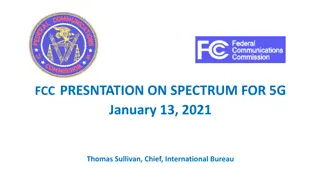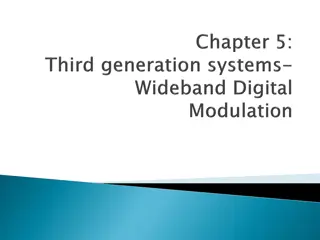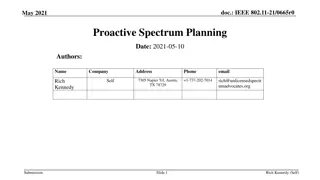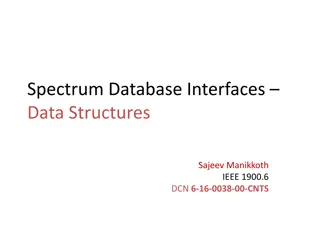Driving Effectiveness with Direct Mail: Key Insights
Direct mail continues to be a powerful marketing tool, offering personalized, targeted, and impactful campaigns in today's digital world. WARC's research highlights the effectiveness of including direct mail in marketing strategies, driving revenue growth, brand building, and overall campaign succes
1 views • 15 slides
Understanding Spread Spectrum Communication
Spread spectrum communication is a favored technology in military and commercial applications due to its resistance to jamming and interception. By spreading signals over a wide range of frequencies, it enhances security through encryption and authentication, making it challenging for attackers to d
4 views • 17 slides
Bioinformatics
Bioinformatics involves analyzing biological sequences through sequence alignment to uncover functional, structural, and evolutionary insights. This process helps in tasks like annotation of sequences, modeling protein structures, and analyzing gene expression experiments. Basic steps include compar
0 views • 6 slides
Understanding Multiple Sequence Alignment with Hidden Markov Models
Multiple Sequence Alignment (MSA) is essential for various biological analyses like phylogeny estimation and selection quantification. Profile Hidden Markov Models (HMMs) play a crucial role in achieving accurate alignments. This process involves aligning unaligned sequences to create alignments wit
0 views • 29 slides
Delicious Chocolate Coconut Modak With Chocolate Hazelnut Spread At Best Rates |
Craving something sweet? Try Chocolate Coconut Modak With Nutrilite Chocolate Hazelnut Spread offers the perfect solution. With its luscious taste and health-conscious ingredients, their spread allows you to indulge without compromise. For more info visit our website: \/\/ \/chocolate-spread\/
1 views • 3 slides
Understanding Direct and Reported Speech in English
Explore the differences between direct and reported speech, learn how to convert direct speech into reported speech, and understand when to use each form in writing. Direct speech uses the speaker's actual words in quotes, while reported speech conveys the gist of what was said without using exact w
2 views • 20 slides
Understanding Fibonacci Sequence and the Golden Ratio
Fibonacci numbers are a sequence of numbers starting with 0, 1, where each number is the sum of the two preceding numbers. This sequence, discovered by Leonardo Fibonacci, displays a fascinating relationship to the Golden Ratio when examining the ratios of consecutive numbers. The Golden Ratio, appr
1 views • 55 slides
Spectrum Sensing for Enhanced Channel Access in Wireless Networks
This document presents a proposal for Spectrum Sensing Based Deferral (SSBD) to improve channel access in wireless networks. SSBD incorporates spectrum sensing with transmission deferral in a time-bound manner to enhance performance, reliability, and latency control. The proposed solution safeguards
1 views • 11 slides
Understanding UML Sequence Diagrams and Their Applications
UML sequence diagrams depict how objects interact in a given scenario, showcasing messages sent between targets on lifelines. They are valuable for detailing use cases, modeling logic, task flow between components, and understanding process functionality. Objects, boundaries, controls, and stereotyp
1 views • 30 slides
Understanding Spread Spectrum Techniques in Data Transmission
Explore the concepts of bandwidth utilization, spreading, and transmission modes in data transmission and digital communication. Learn about spread spectrum techniques such as frequency hopping and direct sequence spread spectrum, which enable efficient sharing of wireless communication channels. Di
1 views • 28 slides
Understanding Spread Spectrum Communication Systems
Spread spectrum techniques involve spreading a signal over a wide bandwidth for various reasons, such as secure communication, resistance to interference, noise, and jamming. This summary introduces Direct Sequence Spread Spectrum (DSSS), Frequency Hopping Spread Spectrum (FHSS), Time Hopping, and h
0 views • 25 slides
Understanding Sequence Generators in Digital Circuits
Explore the concept of sequence generators in digital circuits, focusing on PN sequence lengths, feedback taps, XOR gates, and designing patterns with examples and visual aids, including Karnaugh maps.
1 views • 6 slides
Exploring Fibonacci Sequence, Bee Hives, and Squares in Nature
Discover the fascinating world of Fibonacci sequence through the lens of bees, sunflowers, and mathematical patterns in nature. Learn about the Fibonacci numbers, bee colonies, the beauty of sunflowers, and the mathematical properties of squares. Dive into the history of Leonardo of Pisa and his con
0 views • 16 slides
System Sequence Diagrams: Understanding Artifact for System Behavior
System Sequence Diagrams (SSDs) are vital artifacts that visually illustrate input and output events related to a system. They help define system behavior and interactions, making them essential during the logical design phase of software applications. By depicting events in sequential order, SSDs o
2 views • 24 slides
Effects of Cue-Do-Review Sequence on Teaching Assistant and Student Perceptions
This study explores the impact of the Cue-Do-Review sequence on teaching assistant and student perceptions of learning. The process involves TAs completing surveys, professional development sessions, implementing the sequence, and final surveys. Results show changes in perceptions before and after i
0 views • 12 slides
Understanding Direct and Indirect Objects in Grammar
Direct and indirect objects are essential components of sentences, helping clarify the action and recipients involved. Direct objects receive the action directly, answering the questions "Whom?" or "What?" Indirect objects indicate to whom or for whom the action is done, always appearing between the
0 views • 12 slides
Exploring Sequence Patterns Using Different Representations
Samantha explores sequence patterns with a sequence-generating machine starting with 2 rabbits. She analyzes the pattern, predicts the next terms, and starts a new sequence with an initial value of 5. Join her in creating and organizing sequence families based on growth patterns, finding sequence ge
0 views • 6 slides
Understanding Sequence Alignment in Genetics
Sequence alignment is the comparison of DNA or protein sequences to highlight similarities, often indicating a common ancestral sequence. This process is essential in determining homology and functional similarities between sequences. Types of alignment include global and local alignment, with chall
0 views • 6 slides
Understanding Sequence Alignment and Tools in Bioinformatics
Explore the concepts of homology, orthologs, and paralogs in bioinformatics, along with different types of sequence alignment such as global, local, and semi-global. Learn about popular alignment tools like Blast and Fasta and how they are used for analyzing sequences. Dive into the world of NCBI an
0 views • 32 slides
Understanding EMBOSS Needle: Pairwise Sequence Alignment Tool
EMBOSS Needle is a pairwise sequence alignment tool that uses the Needleman-Wunsch algorithm to find the optimal global alignment between two input sequences. It is available online through EMBOSS and requires entering two protein/DNA sequences of the same length to generate alignment results, inclu
0 views • 11 slides
Understanding Sequence Alignment and Scoring Matrices
In this content, we dive into the fundamentals of sequence alignment, Opt score computation, reconstructing alignments, local alignments, affine gap costs, space-saving measures, and scoring matrices for DNA and protein sequences. We explore the Smith-Waterman algorithm (SW) for local sequence align
0 views • 26 slides
Understanding Frequency Hopping Spread Spectrum Systems
Frequency Hopping Spread Spectrum (FH-SSS) is a technique where the carrier frequency changes randomly using a Pseudo-Noise (PN) code. It is widely used in mobile civilian and military communications for secure and efficient data transmission. FH-SSS systems are classified as Fast or Slow based on t
0 views • 6 slides
ICAO Handbook on Radio Frequency Spectrum Requirements for Civil Aviation Workshops
This handbook provides insights into spectrum requirements for civil aviation workshops conducted in Egypt and Thailand in October 2016. It covers spectrum strategy, frequency management, spectrum overview for aviation, and frequency assignment planning to support the application of SARPs in Annex 1
0 views • 10 slides
Sparse Millimeter-Wave Imaging Using Compressed Sensing and Point Spread Function Calibration
A novel indoor millimeter-wave imaging system based on sparsity estimated compressed sensing and calibrated point spread function is introduced. The system utilizes a unique calibration procedure to process the point spread function acquired from measuring a suspended point scatterer. By estimating
2 views • 26 slides
Costing and Variance Analysis in Manufacturing Processes
The content discusses various scenarios related to costing and variance analysis in manufacturing processes. It addresses topics such as direct materials usage variance, direct labor mix and yield variances, total direct labor efficiency variance, and standard costing system variances. The examples
0 views • 8 slides
Understanding Direct Objects and Direct Object Pronouns
Direct objects receive the direct action of the verb, and when they are people or domesticated animals, the personal "a" is used. Direct object pronouns replace the object to avoid repetition. Learn more about the personal "a", its usage, and how to identify direct objects in sentences.
0 views • 53 slides
Student Direct Deposit Setup Instructions
Follow these step-by-step instructions to set up direct deposit for your student accounting account. Start by accessing the Account Inquiry link under My Account, then navigate to the Account Services tab to enroll in Direct Deposit. Enter your Bank ID/Routing and Account number, agree to the terms,
0 views • 6 slides
Unified Pan-Spectrum Fitting Formula for Suprathermal Particles
Unifying spectrum formulas for suprathermal particles, the proposed pan-spectrum formula provides a versatile fitting method encompassing classic double-power-law, band function, and kappa distribution. Motivated by the need for more accurate spectrum information, the formula introduces five paramet
0 views • 14 slides
Understanding Direct Objects and Direct Object Pronouns in English and French
Explore the concepts of direct objects and direct object pronouns in English and French languages. Learn how direct objects are used in sentences, the role of direct object pronouns in avoiding repetition, and the differences in sentence structure when using object pronouns in French. Discover commo
0 views • 24 slides
Market-Based Spectrum Allocation Strategies in SATRC Countries
Explore the implementation of market-based methods for spectrum allocation in SATRC countries. Learn about the requirements, benefits, and challenges associated with adopting market-based mechanisms, especially in the context of increasing demand for spectrum and technological advancements. Discover
0 views • 41 slides
Next Generation Spectrum Management Initiative Overview
Rich Kennedy presented on the need to change spectrum management practices within IEEE 802, addressing the results of straw polls conducted and proposing further investigation into Multi-band White Space feasibility. The presentation also highlighted the interest in advocating for an AI-managed spec
0 views • 14 slides
Advanced Topics in Communication Systems: Lecture 18 Overview and Final Exam Details
In this lecture, we covered topics such as Spread Spectrum Modulation, Direct Sequence Spread Spectrum (DSSS), Interference Rejection, RAKE Receiver, and Multiuser Systems. The review of the previous lecture focused on OFDM design issues, including timing and frequency offset, peak-to-average power
0 views • 11 slides
Transformer Neural Networks for Sequence-to-Sequence Translation
In the domain of neural networks, the Transformer architecture has revolutionized sequence-to-sequence translation tasks. This involves attention mechanisms, multi-head attention, transformer encoder layers, and positional embeddings to enhance the translation process. Additionally, Encoder-Decoder
0 views • 24 slides
Analysis of Key Elements in the Opening Sequence of "Higher English
The opening sequence of "Higher English" delves into the intricate themes of control, power, deception, and the clash between Italian tradition and American values. Through the characters and dialogues, the sequence explores concepts of justice, violence, crime, corruption, honor, family, and the Am
0 views • 23 slides
Cognitive Radio Network and Game Theory Exploration at University of Houston
Explore the application of cooperative game theory in cognitive radio networks, focusing on spectrum sensing, dynamic spectrum access, and coalitional games. Detailed overview of research conducted at the Department of Electrical and Computer Engineering, University of Houston. Learn about cognitive
0 views • 42 slides
Understanding Sequence Diagrams in Software Development
Sequence diagrams depict the sequence of actions in a system, capturing the invocation of methods in objects. They are a valuable tool for representing dynamic system behavior. Message arrows in sequence diagrams indicate communications between objects, illustrating synchronous and asynchronous mess
0 views • 21 slides
The Future of 5G: FCC's Spectrum Plans and Innovations
The FCC's presentation highlighted the importance of spectrum for 5G development, emphasizing the key components of their 5G FAST Plan. The plan focuses on pushing more spectrum into the market, updating infrastructure policy, and modernizing regulations to drive innovation and investment in the U.S
0 views • 12 slides
Evolution of Communication Systems: From Bandwidth Division to Spread Spectrum
Third-generation communication systems utilize Pseudo-Noise (PN) codes to share bandwidth without interference, while first and second-generation systems divide bandwidth into smaller channels. PN codes are vectors with 1s and -1s, orthogonal to each other. Users transmit data using PN coding, combi
0 views • 14 slides
IEEE 802 Spectrum Planning: Proactive Approach for Improved Spectrum Management
Exploring the need for proactive spectrum planning in IEEE 802 to better manage the complex process of meeting spectrum needs efficiently and effectively. Delving into the challenges of spectrum allocation, sharing, and optimization to ensure that standards have the RF spectrum necessary for their r
0 views • 9 slides
Understanding Spectrum Databases and PAWS Parameters
Explore the world of Spectrum Databases and PAWS parameters, which provide essential information about available spectrum, permissible power levels, regulatory domains, geolocation data, and more. Learn about typical deployments, data types, and spectrum scheduling to enhance your understanding of s
0 views • 16 slides

